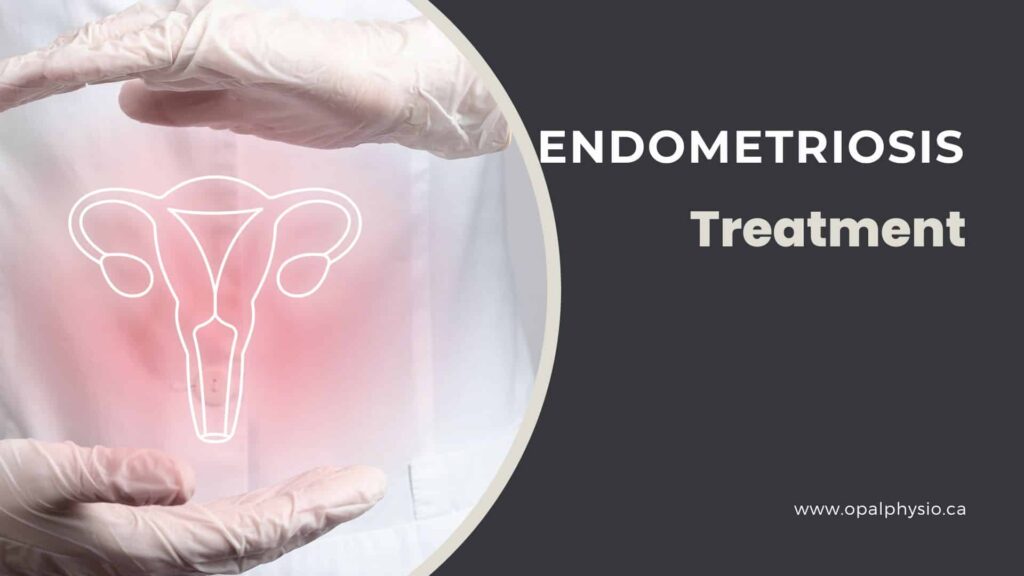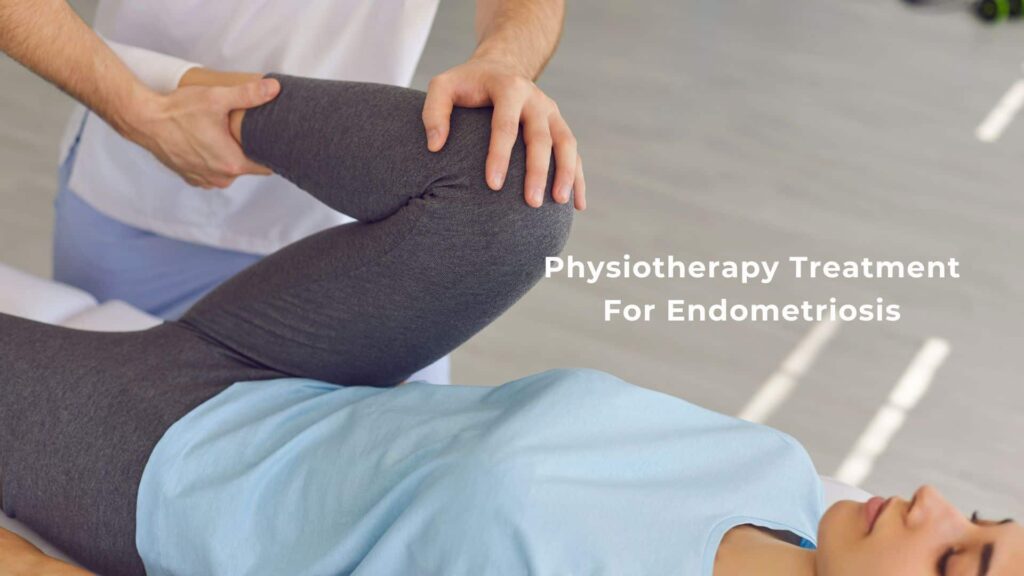Endometriosis – Physiotherapy management
Endometriosis
Endometriosis is a medical condition characterized by chronic pelvic pain and infertility. It is a chronic disorder with various clinical presentations and affects only women. It negatively affects the quality of life and physical well-being of women. Therefore, the management requires a multidisciplinary approach. And physiotherapy plays a beneficial role in treating endometriosis-related pain.
At opal physiotherapy, we can help manage pain to improve the quality of life of those women suffering from endometriosis. In addition, our physiotherapists can help identify and address the different types of pain that a woman may be experiencing to improve their functional ability.

What is Endometriosis?
Endometriosis is a medical condition in which tissue similar to the lining of the uterus grows outside the uterus, typically on the ovaries, fallopian tubes, and other pelvic organs. It can cause chronic pain and infertility and affects millions of women worldwide.
Causes of Endometriosis
Endometriosis is a complicated condition that can affect women universally, from the beginning of their first menstrual period (menarche) through menopause, regardless of the ethnic group or social-economic status. The cause is multifactorial.
These include:
- Cellular metaplasia is the change of cells from one form to another. For example, cells outside your uterus may change into endometrial-like cells and grow into the uterine lining. The endometrial cells are often implants that can break off, travel through your body, and thrive elsewhere.
- Retrograde menstruation: is the backward flow of your menses containing endometrial cells through the fallopian tube during your menstruation period. It may lead to the deposition of endometrial-like cells outside your uterus, where they get implanted and grow.
- Altered immunity; is the inability of your immune system to remove unwanted tissue.
- Hormonal influences: Hormones such as estrogen and progesterone play a role in endometrial growth, and an imbalance in these hormones may contribute to the development of endometrial pain.
- Environmental toxins: Exposure to environmental toxins such as dioxins may increase the risk of developing endometrial pain.
Other causes are:
- Genetics
- Surgery to abdominal areas, such as cesarean delivery or hysterectomy
- Allergies
- Asthma
- Chronic fatigue syndrome
- Ovarian cancer and breast cancer
- Alcohol or caffeine intake.
Symptoms of Endometriosis:
The symptoms are not the same for all women. However, you may present with symptoms such as:
- Intermenstrual bleeding – is when a woman has periods between her menstrual cycles.
- painful periods (dysmenorrhea)
- painful sex (dyspareunia)
- painful excretion/bowel movements (dyschezia)
- painful urination (dysuria)
- Pelvic pain before menstruation
- Back pain
- Nausea and vomiting
- Blood in urine and stool
- Frequent lethargy or fatigue
- Infertility
Potential Complications of endometriosis:
This medical condition has many complications that can reduce your quality of life. The complications include:
- The increased scar tissue on your pelvis and abdominal organs
- Infertility: from tissue adhesion near your ovaries or fallopian tubes.
- Miscarriage or premature delivery
- Severe pain caused by cyst rupture or bleeding.
- Bowel twisting or blockage because of endometriosis of the intestine
- An increased risk of ovarian cancer
The endometrial implantation region may develop a musculoskeletal disorder. Some musculoskeletal complications associated with endometriosis may include:
Physiotherapy can treat these impairments effectively. The disorder affects the pelvic floor muscles differently, and our women’s health physiotherapists can help with your endometriosis pain.

Physiotherapy treatment for endometriosis:
Physiotherapy can be a helpful treatment option for people with endometrial pain. Here are some physiotherapy treatments that may be useful:
Pelvic floor muscle training: Pelvic floor muscle training can help to strengthen the muscles that support the pelvic organs, which can help to alleviate pain and discomfort.
Manual therapy: Manual therapy techniques such as visceral mobilization, myofascial release, and trigger point therapy can help to reduce muscle tension and improve blood flow to the pelvic area.
Exercise: Regular exercise can help to improve overall strength and flexibility, which can also help to reduce pain and discomfort associated with endometriosis.
Pain management: Some pain management techniques, such as heat therapy, TENS (transcutaneous electrical nerve stimulation) and dry needling, may help alleviate pain.
Education: posture, body mechanics, and lifestyle modifications may be addressed to help manage symptoms and prevent further complications.
Relaxation techniques: may be used to help manage your pain symptoms
It is important to consult with a pelvic physio to determine the best treatment plan for your individual needs.
Women with abdominal and pelvic pain will often have an overactive pelvic floor. When we are stressed, the tension in our pelvic floor increases, causing pain. An internal assessment of pelvic floor muscles is usually necessary to help treat the pelvic floor muscles. Our Pelvic health physiotherapists are trained to perform internal pelvic floor assessment, examination of the pelvic floor, and treatment as necessary to help release the tight muscles.
Pelvic floor Rehabilitation treatment aims for pain reduction, rehabilitation and improvement of pelvic floor function, the improved general range of motion and enhanced functional capacity
Pelvic floor Physiotherapists at opal physio are professionals trained to treat your endometriosis symptoms. We can help eliminate endometriosis-associated musculoskeletal complications effectively. If you or know someone experiencing endometriosis pain and have not seen a pelvic floor physiotherapist, we highly encourage you to contact us as soon as possible. We can assist you in leading a quality, pain-free life.
Speak to our physiotherapist about your endometrial pain symptoms. Contact us to book an appointment.
